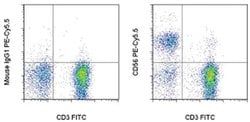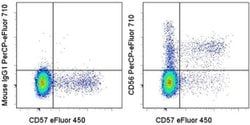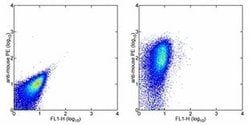CD56 (NCAM) Monoclonal Antibody (5tukon56), eBioscience™, Invitrogen™
Manufacturer: Fischer Scientific
Select a Size
| Pack Size | SKU | Availability | Price |
|---|---|---|---|
| Each of 1 | 50-255-0886-Each-of-1 | In Stock | ₹ 21,271.00 |
50-255-0886 - Each of 1
In Stock
Quantity
1
Base Price: ₹ 21,271.00
GST (18%): ₹ 3,828.78
Total Price: ₹ 25,099.78
Antigen
CD56 (NCAM)
Classification
Monoclonal
Concentration
0.5 mg/mL
Formulation
PBS with 0.09% sodium azide; pH 7.2
Gene Accession No.
P13591
Gene Symbols
Ncam1
Purification Method
Affinity chromatography
Regulatory Status
RUO
Gene ID (Entrez)
4684
Content And Storage
4° C
Form
Liquid
Applications
Immunohistochemistry (Paraffin), Western Blot
Clone
5tukon56
Conjugate
Unconjugated
Gene
Ncam1
Gene Alias
adhesion molecule; antigen recognized by monoclonal antibody 5.1H11; Cd56; CD-56; CD56 120 kDa GPI-linked isoform; CD56 140 kDa isoform; CD56 140 kDa VASE isoform; E NCAM; E-NCAM; MSK39; N CAM1; NCAM; N-CAM; Ncam1; N-CAM-1; NCAM-1; NCAMC; NCAM-C; neural cell adhesion molecule; Neural cell adhesion molecule 1; neural cell adhesion molecule, NCAM; sCD56; sNCAM; soluble CD56; soluble NCAM
Host Species
Mouse
Quantity
100 μg
Primary or Secondary
Primary
Target Species
Human
Product Type
Antibody
Isotype
IgG1 κ
Description
- Description: This 5tuckon56 monoclonal antibody reacts with human CD56, also known as Neural Cell Adhesion Molecule (NCAM)
- CD56 is a highly glycosylated transmembrane molecule expressed in both the developing and adult nervous system and plays a role in neurogenesis, migration, neurite extension, and the homotypic adhesion of neural cells
- In the hematopoietic system, CD56 is expressed on NK cells and a subset of T cells referred to as NKT cells
- For flow cytometric analysis of human CD56, we recommend clones CMSSB or TULY56
- Applications Reported: This 5tukon56 antibody has been reported for use in western blotting, immunohistochemical staining of formalin-fixed paraffin embedded tissue sections, and microscopy
- Applications Tested: This 5tukon56 antibody has been tested by immunohistochemistry of formalin-fixed paraffin embedded tissue sections using low or high pH antigen retreival and can be used at less than or equal to 1 μg/mL
- It is recommended that the antibody be carefully titrated for optimal performance in the assay of interest
- Purity: Greater than 90%, as determined by SDS-PAGE
- Aggregation: Less than 10%, as determined by HPLC
- Filtration: 0.2 μm post-manufacturing filtered
- CD56 (NCAM, neural cell adhesion molecule) is a transmembrane glycoprotein of the immunoglobulin family that serves as an adhesive molecule and is ubiquitously expressed in the nervous system in isoforms ranging from 120-180 kDa
- CD56 is found on T cells and NK cells, and is involved in cell migration, axonal growth, pathfinding and synaptic plasticity
- Polysialic modification results in reduction of CD56-mediated cell adhesion
- Through its extracellular region, CD56 mediates homophilic and heterophilic interactions by binding extracellular matrix components such as laminin and integrins
- CD56 is expressed on most neuroectodermal derived cell lines, tissues and neoplasms such as retinoblastoma, medulloblastoma, astrocytomas and neuroblastoma
- Further, CD56 is a widely used neuroendocrine marker with a high sensitivity for neuroendocrine tumors and ovarian granulosa cell tumors
- Diseases associated with CD56 dysfunction include rabies and blastic plasmacytoid dendritic cell neoplasms.






